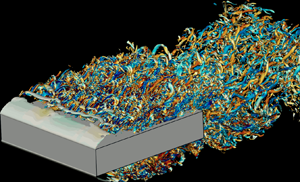Article contents
Structure of turbulence in the flow around a rectangular cylinder
Published online by Cambridge University Press: 11 August 2022
Abstract

The separating and reattaching turbulent flow past a rectangular cylinder is studied to describe how small and large scales contribute to the sustaining mechanism of the velocity fluctuations. The work is based on the anisotropic generalised Kolmogorov equations, exact budget equations for the second-order structure function tensor in the space of scales and in the physical space. Scale-space energy fluxes show that forward and reverse energy transfers occur simultaneously in the flow, with interesting modelling implications. Over the longitudinal cylinder side, the Kelvin–Helmholtz instability of the leading edge shear layer generates large spanwise rolls, which get stretched into hairpin-like vortices and eventually break down into smaller streamwise vortices. Independent sources of velocity fluctuations act at different scales. The flow dynamics is dominated by pressure–strain: the flow impingement on the cylinder surface in the reattachment zone produces spanwise velocity fluctuations very close to the wall, and at larger wall distances reorients them to feed streamwise-aligned vortices. In the near wake, large von Kármán-like vortices are shed from the trailing edge and coexist with smaller turbulent structures, each with its own independent production mechanism. At the trailing edge, the sudden disappearance of the wall changes the structure of turbulence: streamwise vortices vanish progressively, while spanwise structures close to the wall are suddenly turned into vertical fluctuations by the pressure–strain.
JFM classification
- Type
- JFM Papers
- Information
- Copyright
- © The Author(s), 2022. Published by Cambridge University Press
References
REFERENCES
- 10
- Cited by



